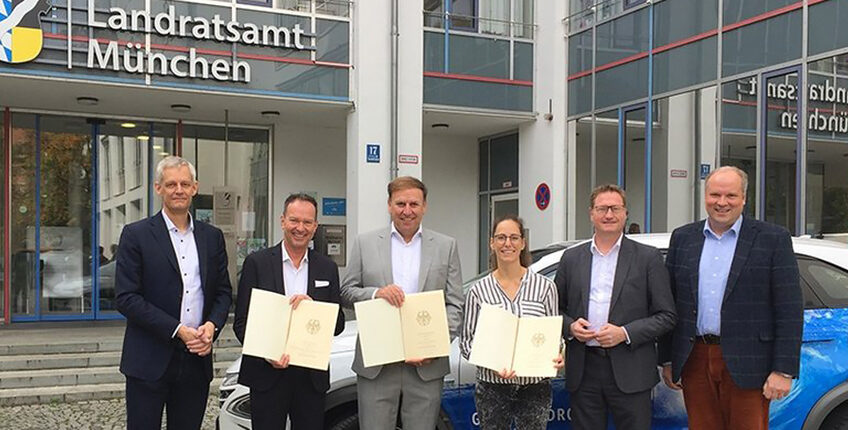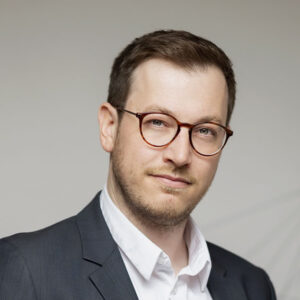The districts of the HyBayern HyPerformer region of Munich, Ebersberg and Landshut, together with other partners from the private sector, intend to establish a green hydrogen cycle in the region by 2025 and invest in fuel cell buses for public transport. On Tuesday, 4 October 2022, the Federal Ministry of Digital and Transport (BMDV – Bundesministerium für Digitales und Verkehr) officially handed over the funding notifications for eleven new hydrogen buses and a hydrogen refuelling station at the district administration office in Munich.
The measure is part of the HyBayern project – one of three HyPerformer regions in Germany – which has been running since 2019. As part of the scheme, the operating company Hy2B Wasserstoff GmbH was established, which is currently dealing with the most important infrastructure elements of the project. These include the 5 MW electrolyser for producing the hydrogen, two hydrogen refuelling stations and several trailers for transporting the hydrogen. All three elements are currently in the construction planning stage.
The Federal Ministry of Digital and Transport (BMDV – Bundesministerium für Digitales und Verkehr) is subsidising 40 to 60 percent of the additional acquisition costs compared to conventional diesel buses. The amount of funding is calculated according to the size of the company.
Daniela Kluckert, Parliamentary State Secretary to the Federal Minister for Digital and Transport:
“Green hydrogen is a cornerstone in the transition to climate-friendly mobility. As part of the HyLand programme, we are supporting the HyBayern region in producing green hydrogen in the region and utilising it in transport. The funding of eleven fuel cell buses and a hydrogen refuelling station are an important step in advancing the transformation of public transport towards climate-friendly technologies. With their commitment, the regional companies are making an important contribution towards achieving the ambitious climate protection goals in transport.”
Fields of application and technology
Just like purely battery-electric buses, fuel cell buses are also electric buses. The electric motor serves as the direct drive system for the vehicle. The fuel cell acts as a generator that produces electricity for the electric motor from hydrogen via an electrochemical reaction that takes place at low temperatures. A major advantage of fuel cell buses compared to conventional diesel buses is that they only emit water vapour. They are also significantly quieter.
As public transport authorities, the districts of Munich and Ebersberg already decided in 2020/2021 to provide the transport companies with substantial financial support for operating fuel cell buses, which are currently still very costly. The overall HyBayern project is funded under the “HyPerformer” category by the “HyLand – Hydrogen Regions in Germany” funding programme with up to 20 million euros from the Federal Ministry of Digital and Transport (BMDV – Bundesministerium für Digitales und Verkehr). The funding is coordinated by NOW GmbH and implemented by Project Management Jülich (PtJ). Roughly 3.5 million euros of this amount are earmarked for the procurement of these eleven buses by the transport companies Ettenhuber, Geldhauser and Reisberger, as well as the construction of the depot refuelling station of the Ettenhuber transport company in Markt Glonn (in the district of Ebersberg). This is a core component of the HyBayern project.
The three transport companies are scheduled to be the first major consumers of green hydrogen in regular service for the MVV. The transport companies Ettenhuber and Geldhauser have jointly ordered ten fuel cell buses, which are to be delivered in mid-2023. The Reisberger transport company is also planning for a fuel cell bus. The buses are to be used in the districts of Munich and Ebersberg.
Costs and funding
The operation of the buses entails considerable additional costs for the districts compared to those of conventional diesel buses, because the diesel buses replaced in this way will initially be maintained as replacement vehicles. The two districts will bear the additional costs for this. Due to the current sharp rise in electricity prices and the resulting difficulty in calculating the price of the Hy2B’s green hydrogen, the exact costs of operating the fuel cell buses cannot be fully estimated at present. The buses have already been ordered and are scheduled for delivery in summer 2023. The bus companies are now preparing their depots for the new technology. This will require modifications to the workshops as well as the purchase of special tools and the training of staff.
Alongside the buses, the depot refuelling station of the Ettenhuber transport company in the municipality of Glonn is also receiving funding support from HyLand. The public refuelling station at the depot of the Geldhauser transport company is planned and operated by Hy2B, but is supported by a Bavarian funding programme.
“I am extremely pleased that the federal government is honouring the commitment of the districts as well as the transport companies with financial support. Against the backdrop of the current energy crisis on the one hand and climate change on the other, I am convinced that this is money that is doubly well invested. The fact that both politics and companies are jointly investing in such promising technologies gives me a positive outlook,” says District Administrator Christoph Göbel from the district of Munich.
“We are certainly heading in the right direction in HyBayern. I very much welcome the fact that we are working together on the project – the federal government, the state of Bavaria, the districts and the bus companies. We are currently taking decisive and concrete steps to get the new hydrogen technology off the ground. It can contribute to replacing climate-damaging fossil fuels. We support this to its full extent,” confirms Robert Niedergesäß, District Administrator of the Ebersberg district.
Caption:
(From left to right): Dr. Tobias Brunner (Hy2B Wasserstoff GmbH), Josef Ettenhuber (Busbetrieb Josef Ettenhuber GmbH), Martin Geldhauser (Martin Geldhauser Omnibusunternehmen im Linien- und Reiseverkehr GmbH & Co. KG), Ruth Jürgensen ( Energieagentur Ebersberg-München), Prof. Dr. Klaus Bonhoff (Federal Ministry of Digital and Transport Affairs), District Administrator Christoph Göbel ( District of Munich)
Image source: Munich District Office


